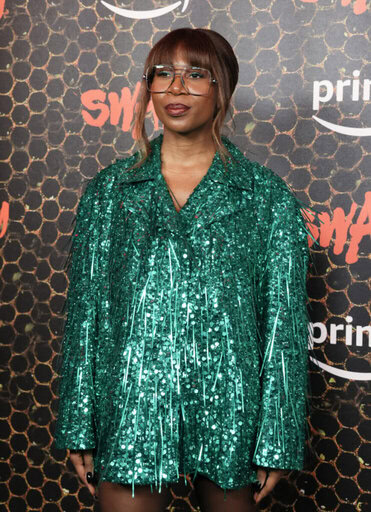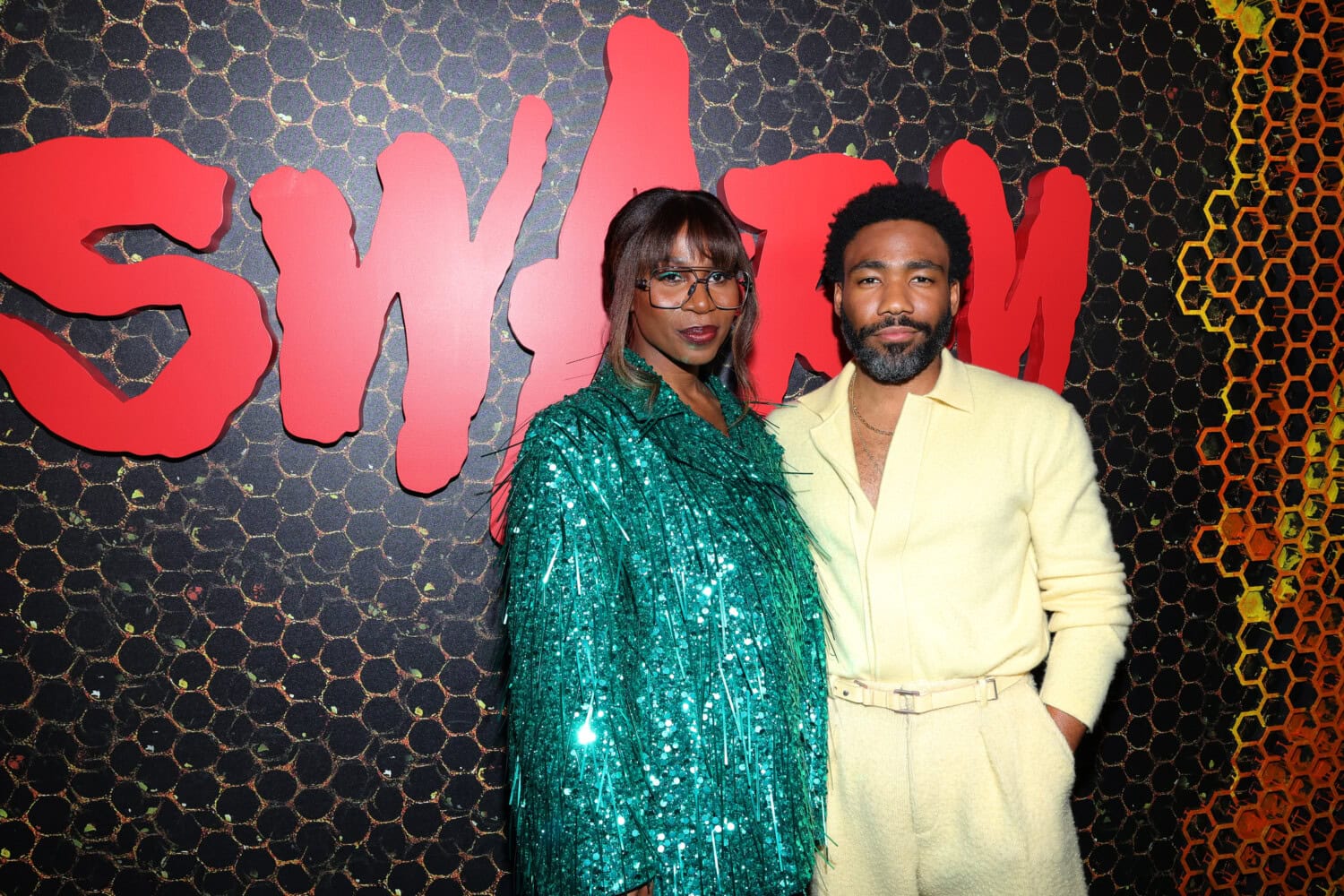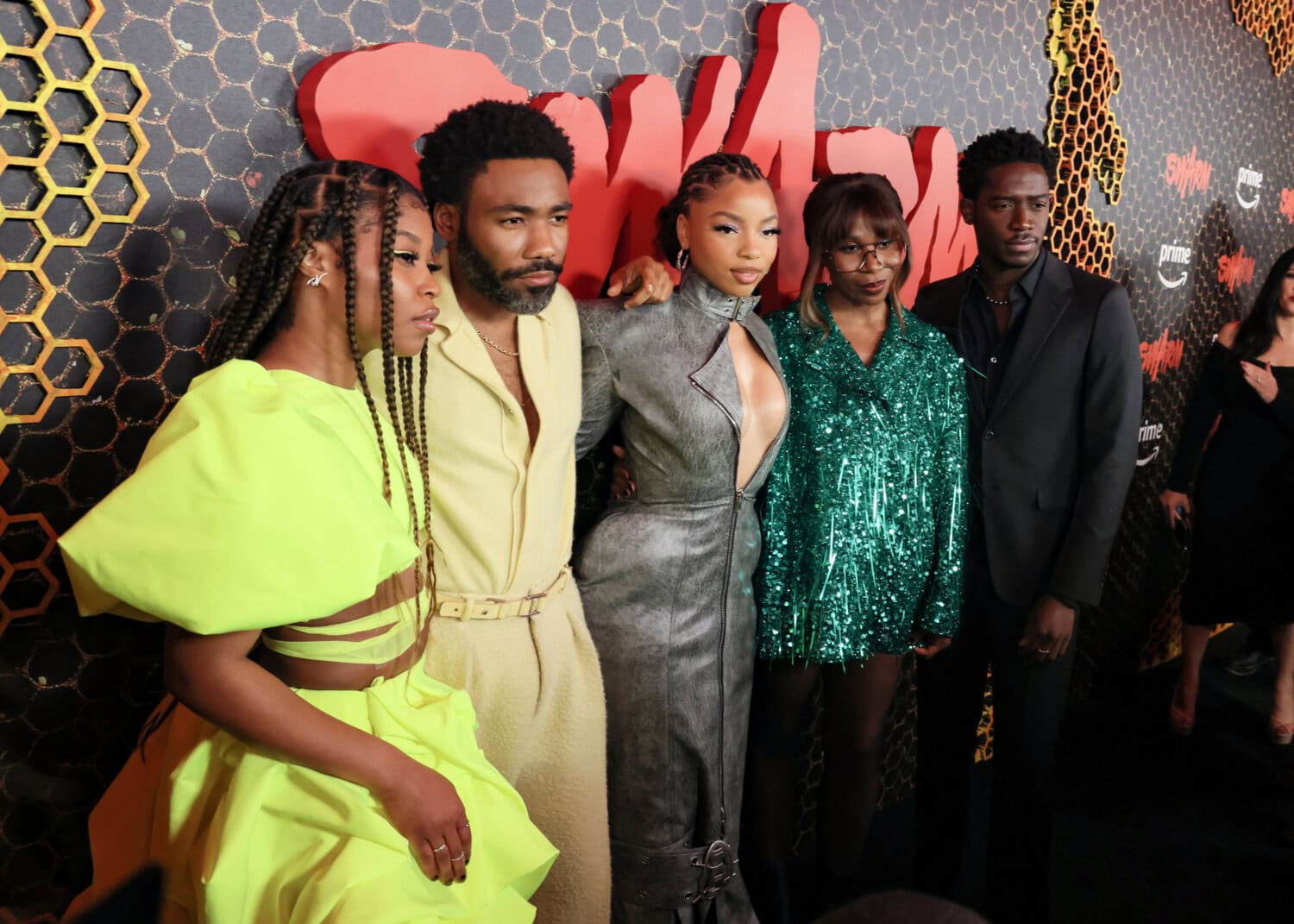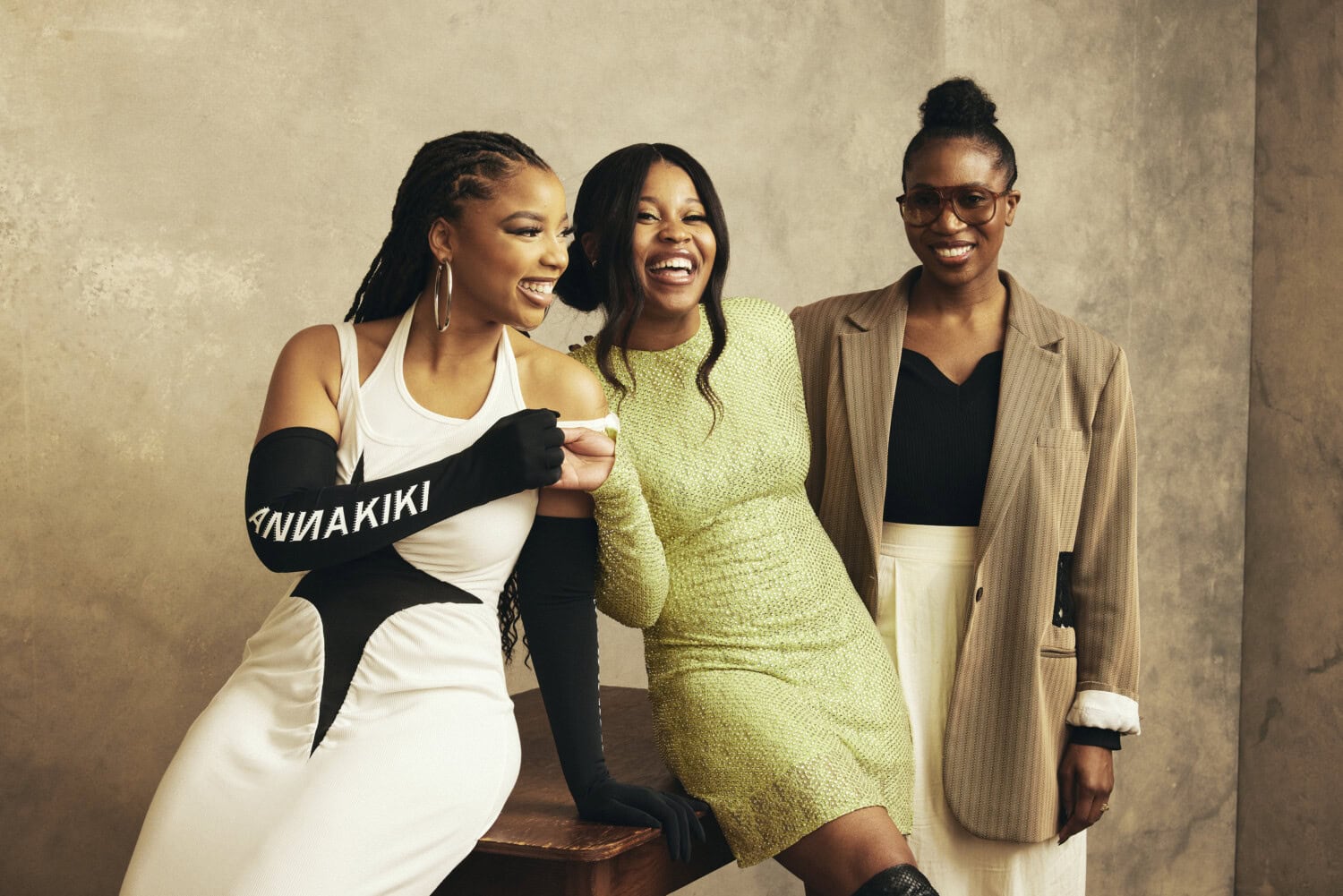This story is part six of Boardroom’s Women’s History Month series highlighting bold figures forging distinctive paths in the worlds of sports, business, culture, and entertainment.
Part I: Morgan DeBaun | Part II: Valentina Shevchenko | Part III: Dany Garcia |
Part IV: Gina Prince-Bythewood | Part V: Carla Banks-Waddles | Part VI: Monica McNutt
Ahead of the premiere of the SWARM limited series on Prime Video, Boardroom spoke with the co-creator about collaborating with Donald Glover and championing Black women in the writer’s room.
Janine Nabers came into FX’s Emmy Award-winning dramedy Atlanta with wide eyes and a bushy tail as she transitioned from longtime fan of the show to full-time writer. Upon entering during Season 3 and contributing to the show for two seasons, Nabers came to develop a seamless creative relationship with creator and star Donald Glover — also known by musical alias Childish Gambino — that is now experiencing a second act on the new Prime Video series Swarm.

“When you create a show with someone, there’s a partnership, there’s a marriage, so it wasn’t like talking to my boss. It was like talking to someone who we’re sharing the same brain [with] and writing the same story and really kind of breaking that together,” Nabers told Boardroom of fast-forwarding their collaboration to the new series starring Dominique Fishback (Judas and the Black Messiah), Chloe Bailey (grown·ish), and Damson Idris (Snowfall).
“It was a joy and really a great gift and I’m just so excited for the world to see it, to see the baby that we made together — our very weird baby.”
Swarm follows the story of Dre as she grapples with the obsession and cult-like behavior surrounding her love and adoration for a fictional pop star while navigating through relationships, self-discovery, and grief. In comparison to other projects that she has worked on in the past, from HBO’s Watchmen starring Regina King to Bravo’s Girlfriends’ Guide to Divorce, Nabers said that leaning into innovation through liberation was the most challenging aspect of developing Swarm into a series.
“I think what was probably the most challenging about it was that we were really trying to break the mold and tell a story in a genre-bending way that hasn’t really been told before,” she said, “with a Black woman at the helm and really committing to the idea of the pilot as the origin story of a villain, and kind of taking it from there and seeing where it goes.”
Though the show originally began production closer to the height of the COVID-19 pandemic, forcing everything to go virtual, the cast and crew ultimately prevailed to create what we know today as the highly-anticipated series. “We really pulled it together and two years in the making, here we are,” Nabers said.
Ahead of the Swarm series premiere on Prime Video on March 17, Boardroom caught up with Nabers about the show’s sensitivity towards mental health and wellness, making room for Black women in Hollywood writers’ rooms, and how Beyoncé’s “Beyhive” fandom may (or may not) have served as an inspiration for the limited series.
D’SHONDA BROWN: What was your initial inspiration for venturing into writing and the entertainment industry?
JANINE NABERS: I had a little bit of a windy road towards it. I was an athlete before and then I had an injury, and then out of that, I thought I was gonna be running into college and stuff like that. I had an elective that I needed to kind of fill space with, so I took a theater class and that then ignited my love for theater and acting. After very briefly acting, I transitioned into writing and had been doing it basically since I was 22.
I’d always wanted to write for TV, but because I was writing plays, I wasn’t quite sure how to get there. I think moving to New York and doing the playwriting scene there was pretty pivotal for me because that allowed me to then make the shift to Los Angeles.
DB: How did the opportunity come about to help bring Swarm to life, and how did it challenge you as a creative?
JN: I met Donald writing on the last two seasons of Atlanta. In our final season, we were really just kind of vibing as storytellers, and that’s when he was like, Hey, I had this kind of crazy idea about a woman obsessed with a pop star, I really want that to be the first thing out after Atlanta, and I would love for you to write it. That was how we started breaking the story together during COVID before we even pitched it to Amazon, and then had this room greenlit to then write the show.

DB: How did your experience and writing style on Atlanta transfer to what grew into Swarm?
JN: I just told the story about how when I became a writer on Atlanta, like the first day in Season 3, [Glover] pitched that half of the season was gonna be our characters and half of it was gonna be these “step-out” episodes. He originally gave me a step-out episode and I basically said to him, ‘the thing that I feel like I really want to do as a writer is to write words that come out of your mouth and the character’s mouths that we know.’ That to me would be the greatest gift and a really great challenge to tackle because I’ve been such a huge fan of this show and the tone of this show.
He then gave me an episode with our characters in it, and that was the moment that it felt like I kind of crystallized my writing world with his because it was really on-point for him. I think from that, we just kind of shifted into this very tonally different idea of Swarm, but still having the same kind of fun fundamental Atlanta values in a way.
DB: How was the creative process different for you when you work by yourself versus partnering with someone like Donald Glover?
JN: It’s definitely different. Donald has created a hit series and wrote an entire hit series on his own and with, obviously, the help of other people. When he goes to then work on a show, obviously there are standards that he has, but I don’t think FX, like, gave him notes — and Amazon didn’t really give us notes either.
At the end of the day, there is a learning curve; a little bit of working with someone who is in their own right established as having done something that was incredibly hard to do. It’s really hard to get your show made, period, but to have a show that’s a hit is a whole other can of worms, and to sustain that show for its entirety as something that’s talked about every season that it’s on is a really hard thing to do.
When you’re working with someone like myself who hadn’t had my own show before, I have an idea of obviously how to tell an incredible story and make it, like, its own thing in the world. We just kind of came together and I was like, ‘look, this is my char when I write characters, I give them very clear, beginning, middle, and ends,’ and that is what this show is. Atlanta was a little bit grayer in that regard.
This is a Black female-driven show. Obviously, I’m a Black woman; there are just things about Black women that Donald can’t write about. That’s the stuff that I think became a really great marriage. I can see what worked about Atlanta and things that could have been better with Atlanta because I came in as a fan. Him understanding that and us taking that into Swarm and coming up with our own DNA and blueprint for a show became a really great way of communicating our own version of a story together. It’s a limited series, so to do that in only seven episodes is a very particular way of looking at a story. I think Donald really appreciated that. I had done that before with like Watchmen and other kinds of limited series, so that was a very good kind of marriage of the mind.

DB: How did you decide to include conversations about mental health, anxiety, and self-harm? Did you use any specific resources to make sure that you address it with sensitivity?
JN: I think at the end of the day, I understand the idea of mental health and writing with that in mind, but what’s great about the character of Dre is that I think people can project whatever they want onto her. When we approached her, we approached her as a fly on the wall in her own world; she’s very much an alien. She’s very much an outsider, so I think people will project whatever kind of description onto her that they see fit.
For me, it’s really about writing someone who is an “other” in a world that we see as familiar and how she reacts to certain situations that enlighten us and terrify us and make us lean in, but also make us say, ‘don’t do that.’
DB: You mentioned that there are certain things as a Black woman from that lens that you can ideate around, but that others can’t because the Black female experience is so different. Even so, every Black female has a different lived experience — why is it important to give Black women the opportunity to be at the forefront of these stories like Regina King in Watchmen and Dominique Fishback and Chloe Bailey in Swarm?
JN: Well, I think we live in a world where a lot of people have been telling stories on behalf of Black women who aren’t Black women. I feel like the sister relationship in Swarm is so very specific. I think people watch that and feel it for a reason because as a Black woman who wrote it, I have an incredible relationship, but also have a very complicated relationship with my sister. I think you get all of that in what this show is, and that is just something that Donald obviously fundamentally understands, but he didn’t want to tell this story because he knew that, like, he shouldn’t tell the story.
I think that is what is really powerful — and I wish that more people would recognize that — because Black women are capable of doing so much more, and I think we’re capable of being seen in so many different ways. It was very purposeful to write Dre in a way that felt very refreshing and felt like something that we had not seen before on TV, because we are approaching this woman where she’s inside of her own life. The pilot story is in a lot of ways the origin story of someone who comes out of their shell — or was it always dormant? That’s the thing that we’re playing with: The character study of someone who feels like an alien to us, but we still are going along for this ride with her.
DB: Why is it important not only to hire but also champion Black women showrunners and Black women in writers’ rooms?
JN: Well, because there’s not that many of us, and I think there are ways in which Black stories are told today that I think can be a little formulaic or can at times get a little tiring. One of the things I set out to do with this project was really break the molds and really put a Black woman at the helm of her own tragedy, in a way, to kind of have it play out with those kind of comedic tones and that kind of avant-garde feel.
It’s very cinematic. Everything was shot on film. It feels a little bit like the “Black Criterion Collection,” which is what we wanted. We wanted to make some sort of noise with that, and that was something I’m very happy about.

DB: When I watched Swarm, I got some elements of horror, I got some thriller, I got some suspense, but I also got some drama. How do go about establishing that perfect balance of genre-bending in a limited series?
JN: I think it just starts with character, honestly. I think with the best characters, you’re gonna feel a lot of different kind of tones with them. I don’t think that comedy, horror, or even drama has to exist in just one tone.
I think what is really great about when we set out to tell this show or to write this show, we were really looking at like the Criterion Collection for TV. Like, let’s look at this very European, old-school way of telling stories and really let it seep into the TV space from a Black lens. That was very important to us, and I think we really kind of nailed that because that was the experiment for us for all seven episodes.
DB: Were you at all nervous about getting any backlash for addressing the cult-like behavior of a pop star’s fan base, or were you excited to take that risk?
JN: No, because this is not a work of fiction. I mean, we are literally taking things that existed on the internet, things that existed in The Daily Mail, things we have seen in real time between 2016 and 2018, and we just put Dre at the center of the story. At the end of the day, we researched a lot about this story and took these moments that were so very clear within a two-and-a-half-year time span and wrote a show around it.
Of course, there’s always gonna be backlash, but why when you look at the facts, you just have to see that we’re writing about real events and real people.
Swarm, co-created by Janine Nabers and Donald Glover, stars Dominique Fishback, Chloe Bailey, and Damson Idris and is now streaming on Amazon Prime Video.